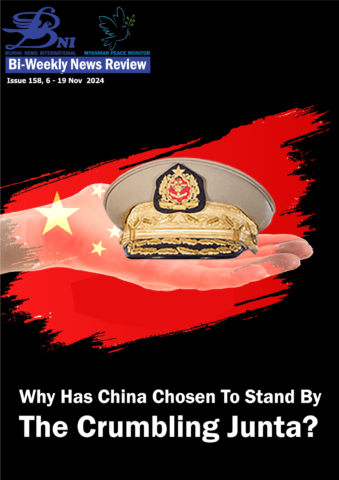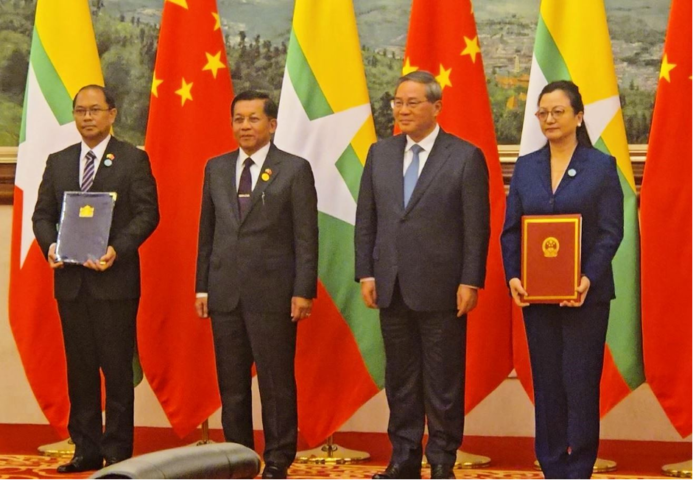
Introduction
The Chinese government, led by President Xi Jinping, has consistently stood by the military junta led by Senior General Min Aung Hlaing. While the Xi Jinping administration has ignored the outcry of the people of Myanmar against the military coup, it has supported the military regime in various ways, both on the international stage and in domestic affairs. Even during periods when resistance forces were preparing to intensify their movement — from the anti-military coup resistance to the ultimate goal of dismantling the military dictatorship and establishing a federal democratic union—the Chinese government maintained its stance of “non-interference in internal affairs” and remained accommodating to the military regime.
“Operation 1027”, launched by the Three Brotherhood Alliance (3BHA) in northern Shan State, caused a great shock to the Chinese government and its interests. At the same time, the coordinated offensive operations of other resistance forces in different regions have also raised eyebrows in the Chinese government, which is closely monitoring its strategic interests in Myanmar. Since then, the Chinese government’s actions, which have clearly sided with the military junta — particularly when the junta has lost 86 towns nationwide to resistance forces — have become intriguingly apparent.
This week’s Burma News International (BNI)-Myanmar Peace Monitor’s Bi-Weekly News Review takes a look at the steps taken by the Chinese government to take a decisive stand on the side of Myanmar’s military junta, which is failing on all fronts, based on data and events.
One billion yuan in aid for the military council
The military council has announced its plan to operate over 20 projects worth approximately one billion Chinese yuan (over US$130 million), with Chinese government’s assistance. Of the more than 130 million, around 15 percent, or over 150 million yuan, will be allocated for census taking, data collection, data verification, and population estimation in areas where data collection is challenging. 1
Myanmar Now has uncovered 77 additional projects for which the military junta has requested assistance from the Chinese government, including hundreds of police vehicles and facial recognition systems for checkpoints. The total cost of all these projects is estimated to be up to four billion yuan (over US$550 million).

During a meeting between the coup leader and Chinese Premier Li Qiang in Kunming on 6 November 2024, Premier Li reportedly endorsed the military council’s Five-Point Roadmap, including the elections planned by the junta and success of those elections, according to the Office of the Commander-in-Chief of Defense Services. Furthermore, Mr. Li emphasized the importance of stability in northern Myanmar and stated that China would not tolerate any actions that could harm Myanmar’s interests while based in China.
So far, the Chinese government has not been able to distinguish between the Myanmar issue and the military junta issue; it appears to be systematically preparing measures and plans in order for Myanmar’s military junta to stay in power.
China’s security measures for its interests
On 22 October 2024, the military council formed a working committee to facilitate the signing of a Memorandum of Understanding for creating a Joint Venture Security Company within Myanmar, as proposed by the Chinese government. The Deputy Minister of the Ministry of Home Affairs serves as the committee’s chairperson. The committee has been tasked with considering various aspects of the MoU, including import and use of weapons and specialized equipment (including communication devices and other restricted items) from abroad, verifying whether they could infringe on sovereignty, assessing whether they would harm the defense and security sectors and determining how to take action if the security company violates existing laws, cultures, and customs, including security and technical issues, after its establishment. 2
The military council, which is suffering losses on all fronts—military, political, international affairs, and public support — has resorted to accepting the Chinese-proposed security firm as a means to regain diminishing trust and support from the Chinese government. This can be seen as an attempt to create a mutually beneficial arrangement and compensate for their rapidly eroding legitimacy.

This is because Chinese Foreign Minister Mr. Wang Yi warned the junta leader to take practical measures to protect the safety of Chinese personnel and projects in Myanmar during their meeting in August 2024. In addition, during a meeting on 21 August 2024 with Chinese Ambassador to Myanmar, Ms. Ma Jia, the military leader promised to do his utmost to protect Chinese projects and personnel in the country.
Therefore, before his trip to Kunming on 6 November, the necessary preparations were made to establish the bilateral joint security company between the two countries, as proposed by the Chinese government.
On the other hand, the Chinese government is pressuring Ethnic Revolutionary Organizations (EROs) to halt their military escalation, urging a ceasefire and dialogue under the pretext of stability in the border region. 3
The Chinese government appears to believe that its economic interests can only be secured with the military regime in power; however, it also seems to fear that the resistance forces will prevail.
That is why China is reluctant to accept a potential scenario in which the Ethnic Revolutionary Organizations (EROs) and resistance forces that emerged from the Spring Revolution come together. For example, the statement from the Myanmar National Democratic Alliance Army (MNDAA) 4 , which has expanded beyond the Kokang region and taken control of Lashio, clearly reflects China’s intentions. Reports indicate that China has even placed MNDAA leader Peng Daxun and United Wa State Party/United Wa State Army (UWSP/UWSA) Deputy Commander-in-Chief Bao Junfeng under house arrest and pressured them to hand over Lashio to the military council. 5
On 25 November 2024, the Ta’ang National Liberation Army (TNLA), a member of the Three Brotherhood Alliance, announced that it would negotiate with the military council for peace, claiming this decision was made due to pressure from the Chinese government and for the sake of the people. 6
However, the Chinese government’s security measures—simultaneously applying pressure on resistance forces while supporting the military junta—are highly unlikely to be effective or conducive to peace during the military coup period.
Review
As mentioned above, considering the support for the military junta and preparations for securing its interests, China appears to believe that the long-term sustainability of its interests in Myanmar, as well as the security of its business projects, including the security of economic projects and safety of Chinese personnel in Myanmar, are directly linked to the junta’s continued rule. Therefore, the Chinese government has bet all in on the upcoming election, hoping to transition to a government of military-turned politicians, similar to the 2010 election.
Chinese Foreign Minister Wang Yi told the coup leader that China firmly supports the military junta’s five-point roadmap and democratic transition process under the framework of the 2008 Constitution. He even reiterated this point during his meeting with the UN Secretary-General’s Special Envoy on Myanmar, Ms. Julie Bishop.
Consequently, factors such as pressuring Ethnic Revolutionary Organizations (EROs) to negotiate with the military council, compelling negotiations for a ceasefire, and the limited ability to assess the military junta’s desire for peace could become stumbling blocks for the security of China’s interests. From the Haigeng Agreement, the Chinese government should learn its lesson.
However, the Chinese government’s clear-cut stance in support of the military regime, which has lost 85 towns to the resistance forces since the coup, and suffered heavy losses —including regional military commands, military camps, and police outposts, is particularly interesting.
On the other hand, this stance is a mockery of the collective unity and strength of all the resistance forces, including the National Unity Government (NUG) and the Ethnic Revolutionary Organizations (ERO), who are working towards ending the military dictatorship and establishing a federal democratic union. Given the lack of trustworthy indications of resistance forces for securing its interests in Myanmar, it is not surprising that China has chosen to support the military junta, which has been weakened on all fronts.
Chinese Foreign Ministry spokesperson Mao Ning even criticized the International Criminal Court (ICC) prosecutor’s request for an arrest warrant for the military coup leader during a press conference in Beijing on 28 November stating:
“If the UN Security Council does not transfer the case, the Court has no jurisdiction over countries and territories that have not signed the Rome Statute.”
1 China to give junta 1 billion yuan to survive, Myanmar Now, 21 November 2024
2 Military junta planning joint security firm with China, Mizzima, 13 November 2024
3 “Operation 1027” Second Phase And China’s Restless Moves, BNI-MPM, August 2024
4 MNDAA declares no military or political alliance with NUG, will not launch offensives in Mandalay and Taunggyi, Mizzima, 19 September 2024
5 China arrests MNDAA leader and Wa deputy military chief, pressuring resistance forces, People’s Spring, 18 November 2024
6 TNLA to negotiate with junta due to Chinese pressure, RFA, 25 November 2024
